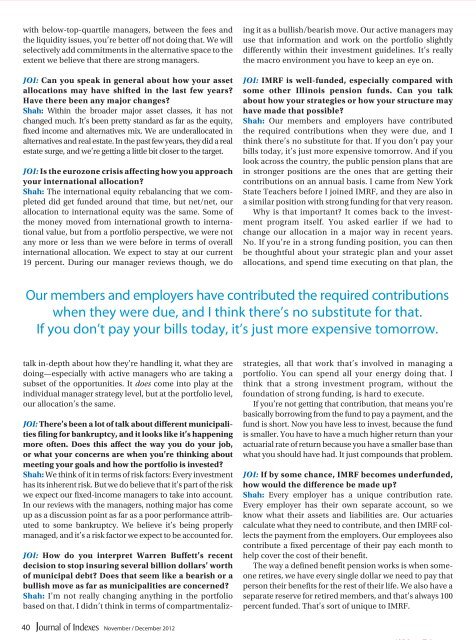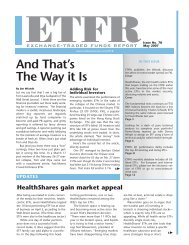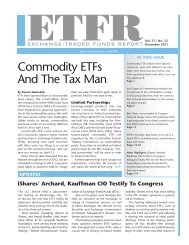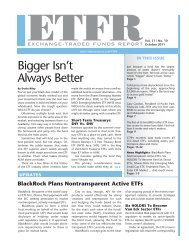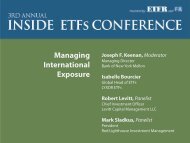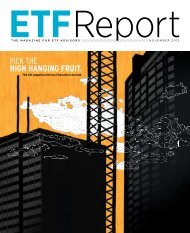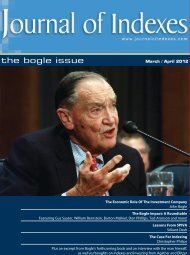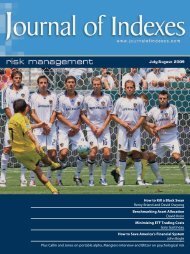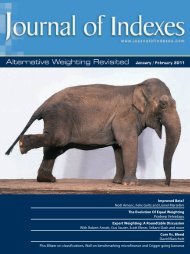Download complete issue - IndexUniverse.com
Download complete issue - IndexUniverse.com
Download complete issue - IndexUniverse.com
You also want an ePaper? Increase the reach of your titles
YUMPU automatically turns print PDFs into web optimized ePapers that Google loves.
with below-top-quartile managers, between the fees and<br />
the liquidity <strong>issue</strong>s, you’re better off not doing that. We will<br />
selectively add <strong>com</strong>mitments in the alternative space to the<br />
extent we believe that there are strong managers.<br />
JOI: Can you speak in general about how your asset<br />
allocations may have shifted in the last few years?<br />
Have there been any major changes?<br />
Shah: Within the broader major asset classes, it has not<br />
changed much. It’s been pretty standard as far as the equity,<br />
fixed in<strong>com</strong>e and alternatives mix. We are underallocated in<br />
alternatives and real estate. In the past few years, they did a real<br />
estate surge, and we’re getting a little bit closer to the target.<br />
JOI: Is the eurozone crisis affecting how you approach<br />
your international allocation?<br />
Shah: The international equity rebalancing that we <strong><strong>com</strong>plete</strong>d<br />
did get funded around that time, but net/net, our<br />
allocation to international equity was the same. Some of<br />
the money moved from international growth to international<br />
value, but from a portfolio perspective, we were not<br />
any more or less than we were before in terms of overall<br />
international allocation. We expect to stay at our current<br />
19 percent. During our manager reviews though, we do<br />
JOI: How do you interpret Warren Buffett’s recent<br />
decision to stop insuring several billion dollars’ worth<br />
of municipal debt? Does that seem like a bearish or a<br />
bullish move as far as municipalities are concerned?<br />
Shah: I’m not really changing anything in the portfolio<br />
based on that. I didn’t think in terms of <strong>com</strong>partmentalizing<br />
it as a bullish/bearish move. Our active managers may<br />
use that information and work on the portfolio slightly<br />
differently within their investment guidelines. It’s really<br />
the macro environment you have to keep an eye on.<br />
JOI: IMRF is well-funded, especially <strong>com</strong>pared with<br />
some other Illinois pension funds. Can you talk<br />
about how your strategies or how your structure may<br />
have made that possible?<br />
Shah: Our members and employers have contributed<br />
the required contributions when they were due, and I<br />
think there’s no substitute for that. If you don’t pay your<br />
bills today, it’s just more expensive tomorrow. And if you<br />
look across the country, the public pension plans that are<br />
in stronger positions are the ones that are getting their<br />
contributions on an annual basis. I came from New York<br />
State Teachers before I joined IMRF, and they are also in<br />
a similar position with strong funding for that very reason.<br />
Why is that important? It <strong>com</strong>es back to the investment<br />
program itself. You asked earlier if we had to<br />
change our allocation in a major way in recent years.<br />
No. If you’re in a strong funding position, you can then<br />
be thoughtful about your strategic plan and your asset<br />
allocations, and spend time executing on that plan, the<br />
Our members and employers have contributed the required contributions<br />
when they were due, and I think there’s no substitute for that.<br />
If you don’t pay your bills today, it’s just more expensive tomorrow.<br />
talk in-depth about how they’re handling it, what they are<br />
doing—especially with active managers who are taking a<br />
subset of the opportunities. It does <strong>com</strong>e into play at the<br />
individual manager strategy level, but at the portfolio level,<br />
our allocation’s the same.<br />
JOI: There’s been a lot of talk about different municipalities<br />
filing for bankruptcy, and it looks like it’s happening<br />
more often. Does this affect the way you do your job,<br />
or what your concerns are when you’re thinking about<br />
meeting your goals and how the portfolio is invested?<br />
Shah: We think of it in terms of risk factors: Every investment<br />
has its inherent risk. But we do believe that it’s part of the risk<br />
we expect our fixed-in<strong>com</strong>e managers to take into account.<br />
In our reviews with the managers, nothing major has <strong>com</strong>e<br />
up as a discussion point as far as a poor performance attributed<br />
to some bankruptcy. We believe it’s being properly<br />
managed, and it’s a risk factor we expect to be accounted for.<br />
strategies, all that work that’s involved in managing a<br />
portfolio. You can spend all your energy doing that. I<br />
think that a strong investment program, without the<br />
foundation of strong funding, is hard to execute.<br />
If you’re not getting that contribution, that means you’re<br />
basically borrowing from the fund to pay a payment, and the<br />
fund is short. Now you have less to invest, because the fund<br />
is smaller. You have to have a much higher return than your<br />
actuarial rate of return because you have a smaller base than<br />
what you should have had. It just <strong>com</strong>pounds that problem.<br />
JOI: If by some chance, IMRF be<strong>com</strong>es underfunded,<br />
how would the difference be made up?<br />
Shah: Every employer has a unique contribution rate.<br />
Every employer has their own separate account, so we<br />
know what their assets and liabilities are. Our actuaries<br />
calculate what they need to contribute, and then IMRF collects<br />
the payment from the employers. Our employees also<br />
contribute a fixed percentage of their pay each month to<br />
help cover the cost of their benefit.<br />
The way a defined benefit pension works is when someone<br />
retires, we have every single dollar we need to pay that<br />
person their benefits for the rest of their life. We also have a<br />
separate reserve for retired members, and that’s always 100<br />
percent funded. That’s sort of unique to IMRF.<br />
40<br />
November / December 2012


